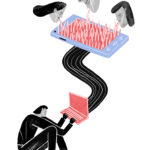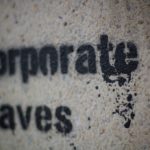Amanda Fucking Palmer is loud, so loud it might seem like she’s screaming for attention – and some people on the Internet hate her for it. But guess what? She has a lot of things to say.
This has never been more evident than on Palmer’s third solo album, aptly named There Will Be No Intermission. Apt because, at twenty songs and seventy-eight minutes long, this album is resolute in delivering a powerful, politically-conscious message of resistance and survival. It is not only sorrowful, pained, even tragic; but also angry, breathless with fury. The cover, which features a naked Palmer brandishing a sword high above her head, anticipates the tone of the album in both its extremes.
Where Art Comes From
Time and time again, the singer-songwriter taps deep into her emotional experiences. Whether as a sister – “And I tried to call my brother || but he no longer exists” (Palmer lost her brother in 1996) in “Bigger on the Inside”; a mother – “I know it’s hard to be a parent || But this mess is so gigantic || I wonder if I should have had a child” in “A Mother’s Confession”; a friend – “I have never liked the box of knives || I took it to the oceanside the day you died || I stood out on the dock || No matter how hard I tried || I couldn’t drop them in || And I collapsed and cried: || What do I do with this stuff? || It seems like yesterday you were alive || And it’s as if you never really died” – in “Machete”; and a daughter – “Remember the daughter || And all that you taught her || She’s grown up at last || With a child of her own || She struggles alone || As the years all rush pass” – in “Look Mummy, No Hands”. But perhaps most striking are the songs which have a direct link to women’s reproductive rights, namely “Drowning in the Sound” and “Voicemail for Jill”.
The music video for “Drowning in the Sound” sees Palmer perform her sexuality, her role and experience as a mother and artist, even her role as a performer itself, to staggering effect, eerily resembling David Bowie’s performance of his own death in “Blackstar” and “Lazarus”, released a few days before Bowie’s passing from cancer.
“Voicemail for Jill” is a deeply emotional piece about abortion and the psychological effects of it – the video is difficult to watch because of its raw emotions at display, and the honest, powerful way the lyrics delve into the heart of the struggle to survive and continue living. Pregnancy becomes something a woman is expected to suffer through and be grateful, or end and be shunned, even persecuted for. Even so, the hopeful note the song ends on, the notion of support and some small measure of happiness reclaimed, these capture the heart of a vulnerable moment in the lives of many women, the struggle society often expects them to grit their teeth through in silence.
The message in “Voicemail for Jill” and the album as a whole comes at a time of organised assault against women’s reproductive rights in the United States of America, both on a federal and state level. A secular government uses religious justification to rob women of their hard-earned rights, fought for over the last century. What is a politically-charged artist to do about it? According to Palmer, the way forward is “to share the naked truth of [our] experiences”.
A Slide Back into the Middle-Ages
When these experiences include barbaric laws like the one passed last year by the governor of Alabama, which would see abortions permitted “only if the mother’s life is at risk or if the fetus cannot survive, but not in cases of rape or incest.” The bill was passed by legislators later in the month of May 2019 and was supposed to enter into effect on November 15. While it was temporarily blocked by a federal judge at the end of October, the authors of the bill seek to table discussion of the contested law to the Supreme Court. With Trump’s Conservative Supreme Court appointees tipping the balance in favour of so-called Pro-Life ideas, the likelihood of such a case being struck down in favour of the status quo is doubtful.
Though Alabama is singular in its draconian law, other states have introduced bills which seek to cut down the period in which women could get an abortion: “Georgia, Kentucky, Louisiana, Missouri, Mississippi and Ohio stopped short of outright bans, instead passing so-called heartbeat bills that effectively prohibit abortions after six to eight weeks of pregnancy, when doctors can usually start detecting a fetal heartbeat. Utah and Arkansas voted to limit the procedure to the middle of the second trimester.”
The most outrageous bill proposed yet, however, is one in Ohio. If passed, this bill would demand doctors do a “procedure that does not exist in medical science,” namely the re-implanting of an ectopic pregnancy in a woman’s uterus. Not only is this an impossible procedure to do, the refusal to do it would result in obstetricians and gynecologists being charged for “criminal charges, including murder”. This will be punishable by life in prison. Another new crime, “aggravated abortion murder”, is punishable by death, according to the bill. Such abortion laws would make women criminals for exercising their personal autonomy. The narrative told in “Voicemail for Jill” would look and sound much different if it were set in any one of these states.
Here again, Amanda Palmer’s words resonate: “frightening political climates make for really good, real, authentic art.” There Will be no Intermission is but the latest example of great art as backlash to a dark political reality. In her own words: “If the political climate keeps getting uglier, the art will have to answer. We will have to fight…We are sharpening our knives for a large buffet.” With the political landscape of both the United States and the world at large turning darker, the fight has only just begun.
by Filip R. Zahariev
Photo Credits
AFP, OpenEye, CC BY-NC-ND 2.0
Amanda Palmer Posters, Vladimir Zimakov, CC BY-NC-ND 4.0
‘Abortion Never’ Galway City, NationalPartyIE, CC BY 2.0










